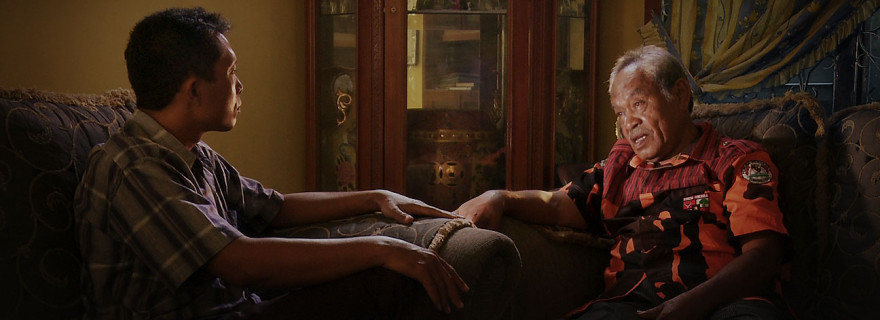'The Look of Silence'
Movie Rating:
4.5
Joshua Oppenheimer’s ‘The Look of Silence’ is an open continuation of his stunning documentary ‘The Act of Killing‘. Once again dipping into the disgusting horrors of the Indonesian genocide, this time the filmmaker gives the victims a voice and the results are as harrowing in a different way. The film might lack the gob-smacked surrealism inherent in his previous unique feature, but given that ‘The Look of Silence’ is more satisfying in its gut-wrenching intent, that’s easy to overlook.
For those unfamiliar, the subject of Oppenheimer’s companion piece docs is the 1965 Indonesian genocide in which roughly a half million people were brutally murdered at the hands of a newly formed military government that labeled any doubters “Communists” and punished that crime by death. The psychotics who ran in the death squads were not only never punished for the crimes, but retain positions of power in the country to this day. In his last feature, Oppenheimer convinced many former death squad members to re-enact their vicious activities, which they did with deeply disturbing cheer. The movie rather brilliantly ended with a man vomiting as he realized the weight of his actions for the first time. That’s kind of where ‘The Look of Silence’ picks up.
The main subject of Oppenheimer’s new film is Adi, a man whose brother was killed particularly brutally during the raids. The director got footage of the perpetrator jovially and nostalgically discussing the murder for ‘The Act of Killing’ and shows that footage to Adi here. The man’s heartbreaking stoned-face reaction to the material is where Oppenheimer drew his title. Somehow it’s far from the most provoking moment in his new feature. Adi works as an optometrist, traveling between villages, testing eyes and fitting glasses. Under the guise of giving them glasses to correct their vision (a poignant metaphor, intended or not), Oppenheimer arranges visits between Adi and surviving death squad members and their families, giving the man a chance to directly confront the people who needlessly murdered his brother. It’s quite the concept for a follow-up to the remarkable ‘The Act of Killing’, and directly addresses the one flimsy criticism flung that feature, which is that it didn’t give the victims a voice. That never bothered me since those deeply disturbed murderers had no problem hanging themselves, but ‘The Look of Silence’ quickly proves that a companion film was necessary.
To an extent, this is ambush documentary filmmaking, yet it’s hard to get tangled up in any concerns regarding journalistic ethics when the supposed victims are casual mass murders proud of the crimes they were never punished for. When Adi approaches his subjects as an optometrist first, the conversations are almost tender with the surreal and symbolic sight of the bizarre plastic eyewear he uses for testing, which heightens the material in almost inexplicable ways. The reactions vary wildly from direct threats that leave Adi feeling unsafe to irritated dismissals by people who have clearly never considered the legacy of their actions.
The two most fascinating reactions come not from actual former death squad members, but their family members. One daughter reacts in horror and attempts to apologize for her father and write him off as a senile mess while seated next to him in potent moment. The other comes from the wife and sons of a recently deceased death squad captain (who actually wrote and illustrated a book outlining his brutal crimes that he concealed from his family) who are unable to accept or even acknowledge the past. Every meeting Adi takes is layered with meaning and fraught emotion so strong that it’s impossible to tear your eyes from the screen no matter how desperate you are to turn away.
Taken together, ‘The Act of Killing’ and ‘The Look of Silence’ are truly remarkable achievements for Oppenheimer. The former showcased the almost psychotic arrogance and inhuman lack of sympathy required for the perpetrators of genocide to go on with their lives. The latter showcases the deep scars of the victims and subsequent generations who will never fully recover from the events. (In addition to Adi’s interviews, Oppenheimer also shows some chilling side-stories, like contemporary Indonesian school children still being taught the evils of Communists.) Both are well constructed enough to work beautifully on their own, but together they feel like something special and unprecedented.
This is fearless documentary filmmaking that Oppenheimer (along with a crew primarily credited anonymously for their personal safety) turned into something historically important, intellectually challenging, emotionally devastating, and genuinely cinematic. Directors often wait entire careers hoping to accomplish what Oppenheimer has delivered in his first two theatrically released features. It will be fascinating to see how he could possibly follow up these films. Yet, even if that proves to be an impossible task, his legacy as one of the documentary greats is already assured.




Julian
Wow, I had no idea this doc was forthcoming. ‘The Act Of Killing’ is, indeed, chilling, gutwrenching and bonechilling. And, expertly made.